It depends.
There’s no evil brand label over coffee when it comes to kids, but there are some things to be worried about because of the caffeine content.
Kids coffee is also notorious for having a ton of additives and artificial flavors thrown in.
No twelve-year-old is drinking a cup of black coffee without sugar; they’re mixing syrups in, melting sugar, and adding tons of cream (calories plus even more sugar).
Let’s talk about that, about moderation, and why it’s probably not a good idea to let your children start drinking coffee until they’re older.
Should You Let Your Kid Drink Coffee?
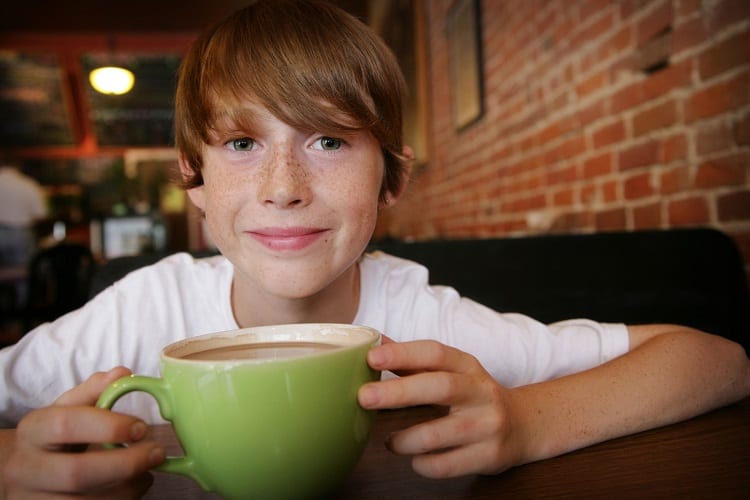
No, you shouldn’t.
It’s been proven that, as an adult, there’s nothing wrong with drinking a decent amount of caffeine every day.
In fact, later on, we’re going to tell you all about the benefits of caffeine and the B vitamins found in every type of coffee.
So why shouldn’t kids have it?
Because as an adult, we’re done growing. Children require more sleep than adults, and caffeine is a mental stimulant that can drastically interfere with that sleep.
It could either mean they’re going to bed later or not getting sufficient REM sleep, which is paramount for proper development.
From the age of three to five, your children should be getting up to thirteen hours of sleep every single day. All in one solid block.
From six to thirteen years old, they still need about eleven hours, which is more than you or I are getting as adults (the coffee makes up for that).
That’s a big chunk of time that we really shouldn’t be interfering with.
It’s important to remember that everyone sleeps differently, but if your children are healthy and in a good weight range, they should be sleeping very soundly and waking up feeling refreshed.
Caffeine, being a total body stimulant (affects breathing, heart rate, brain stimulation) can increase blood pressure by narrowing vessels.
There’s not much of harm in that for adults since it would literally take seventy-two ten-ounce cups, or six gallons of coffee (all drank within a short amount of time) to be considered lethal.

But it’s still not something that your child naturally does during their development.
Increased blood pressure can make it hard to sleep at night, regardless of your age, and you can probably think of a few times that you had too much coffee and couldn’t sleep well at night.
Apart from caffeine, the major problem with kids drinking coffee is that almost zero children actually enjoy the taste of the coffee.
Even if you think about how a lot of adults drink their coffee, they don’t just get it black, they add calories from cream, and sugar from flavored syrups or processed white sugar.
For children, that’s where the main problem rests.
Kids are already getting too much sugar. Above the age of two, they shouldn’t have more than about six teaspoons worth of sugar each day, which equates to 25 grams.
They also shouldn’t have more than one pre-sweetened beverage in a single week.
Considering that the average soda, a can of Coca-Cola, has 39 grams of sugar in it, children are definitely already getting too much sugar as it is.
A lot of parents give their kids soda despite the extremely harmful effects it can have, so having sweetened coffee is arguably no better (depending on the additives, and do remember, there is sugar in cream and milk).
What Type of Coffee is Acceptable for Children to Drink?
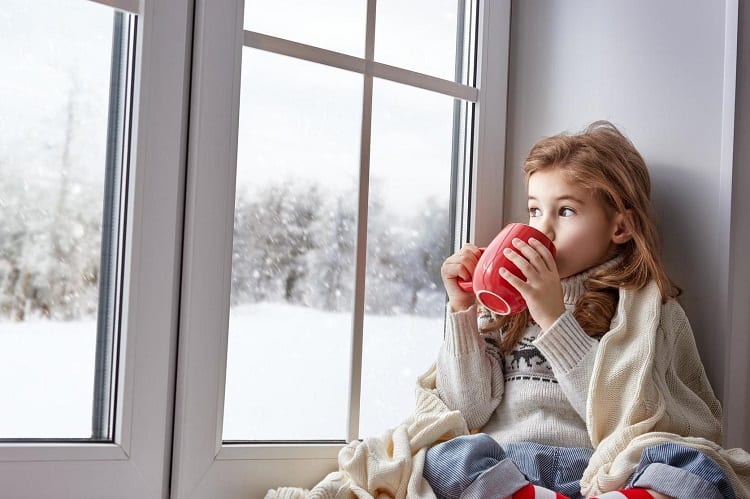
Arabica coffee is okay for children to drink if it’s something that you want to do, but you should avoid robusta coffee beans and espresso at all costs.
Robusta beans have more caffeine than arabica, and we’re trying to keep that to a minimum here.
The ironic thing is that espresso beans are actually arabica coffee beans as well, but they’re roasted differently, and their extraction process uses immense pressure, which pulls out more caffeine in a concentrated shot.
For some context, an average shot of espresso (two ounces) has about as much caffeine as a normal ten-ounce cup of coffee.
So avoid lattes and cappuccinos. If you’re going to give your child coffee, it should be standard arabica beans that are brewed normally.
Even then, we have to talk about the amount of caffeine in a normal ten-ounce cup of coffee, and if it’s really safe for your child in the first place.
Is It Safe?
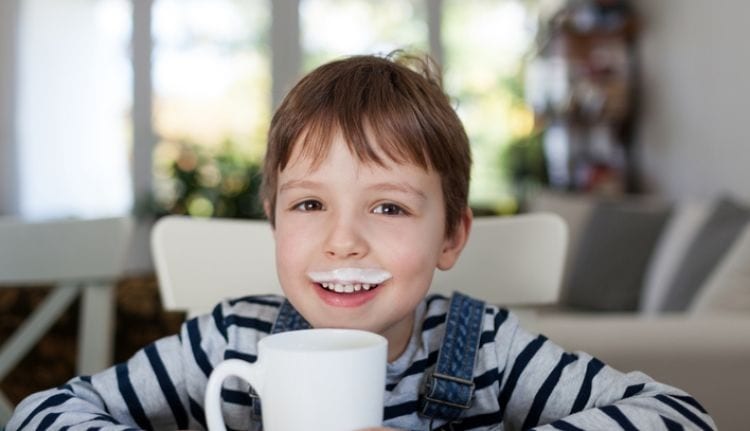
Caffeine is a stimulant, not a poison.
It is safe for almost everyone to consume, apart from those with diagnosed heart conditions that have been explicitly instructed by a doctor or medical professional to avoid drinking coffee or caffeine.
It’s safe as in it’s not going to kill you, but it does affect how your body operates. For children, it’s far more potent.
Remember when you first tried coffee, and you were buzzed out of your mind?
Now you’re probably drinking two to three cups a day just to make it to the five o’clock whistle.
Do you know what happened along the lines?
You developed a tolerance to caffeine. That’s not a good thing.
It means you have it so often that your body is almost requiring you to function with it, otherwise, you end up with withdrawal in the forms of migraine headaches and irritability.
Children have that same initial reaction to caffeine; it charges them up, and it doesn’t wind them down.
It’s the same amount of caffeine that you would drink in your adult body, but it’s in this little eighty-pound person that doesn’t know how to dispel that energy.
Children shouldn’t have more than 100mg of caffeine on any given day.
They can breach this limit simply by consuming chocolate, which naturally contains caffeine in it. Be extremely wary of what you’re feeding your children.
When Should You Allow it?
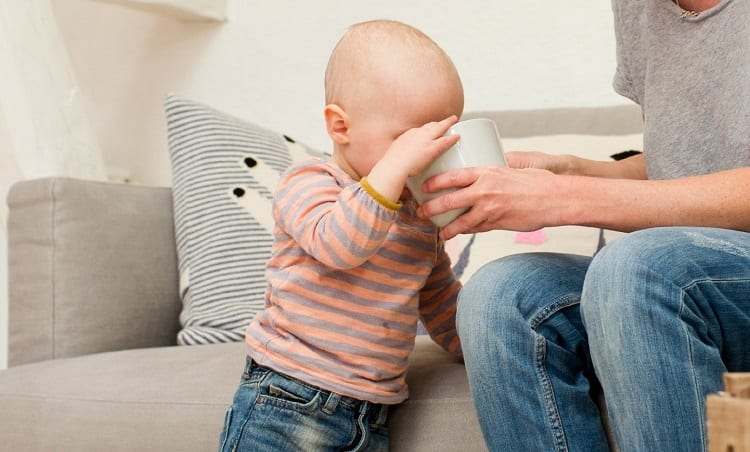
If possible, never.
At some point, when your child becomes a teenager, they’re going to be out of the house for extended periods of time.
They’re going to have money from part-time jobs and be hanging out with friends, so they’re going to drink coffee while they’re out.
But up until that point, it’s best if you can just avoid giving them caffeine altogether.
While caffeine doesn’t directly stunt growth, it has side effects that can severely impact development on multiple fronts. It’s time to go over those.
Side Effects of Caffeine on Childhood Development
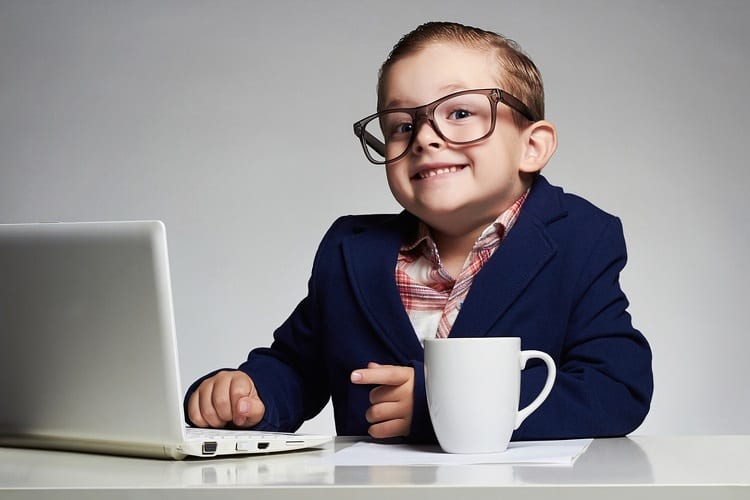
Caffeine plays a major role in western culture and is marketed to children as young as five years old.
It’s a stimulant, and therefore, it is considered a drug, yet the FDA has no regulations on it despite the known harmful effects below.
- Unnecessary Stimulation: One might argue that this is a direct effect and not a side effect, but it affects all of us differently. Your child does not need their brain to be stimulated through caffeine for any reason.
- High Blood Pressure: Under no circumstances should a child suffer from high blood pressure. This can be attributed to irritability, difficulty sleeping at night, heart complications, and hypertension.
- Headaches: This can come from high blood pressure, but can also be persistent even if blood pressure is not an issue with your child. Headaches can be caused by the caffeine itself, or withdrawal once the child stops drinking caffeine.
- Dehydration: Many people have the wrong idea here. Coffee doesn’t dehydrate you. It doesn’t sap liquid from your body and force it to be expelled. Instead, as a stimulant, it is also a diuretic. That means you process liquid and urinate faster, which in turn can dehydrate you.
- Sleep Deprivation: This affects blood pressure, how your heart works, how your mind operates. It affects everything. Sleep deprivation will hinder proper growth, especially since children need so much more sleep than adults do.
In short, your children don’t need caffeine. Once you’re an adult, and the growing is done, you don’t need to worry about caffeine intake.
You should keep it under 500mg per day to prevent any health concerns, but it’s not going to affect development—you’re developed, so drink away.
Soda, coffee, and worst of all energy drinks—they all have massive amounts of caffeine, more than any child should be expected to handle.
This stimulant may inhibit an otherwise addictive personality, though the literature on that has yet to be completed.
However, it’s safe to say that if you tell yourself you need something every single day to be a functioning member of society, that falls in line with the definition of addiction.
Moderation is Key
It’s totally up to you.
Allowing your child to drink coffee is your own decision, though there are clear and scientifically-backed articles and information that state that it’s not a good idea.
A cup here and there isn’t bad. 100mg is the limit, but you have to think about all the additives that kids want in their coffee, and what that does to their system as well.
Know the facts, and as their parent or guardian, make an informed decision that best suits you and your family.
